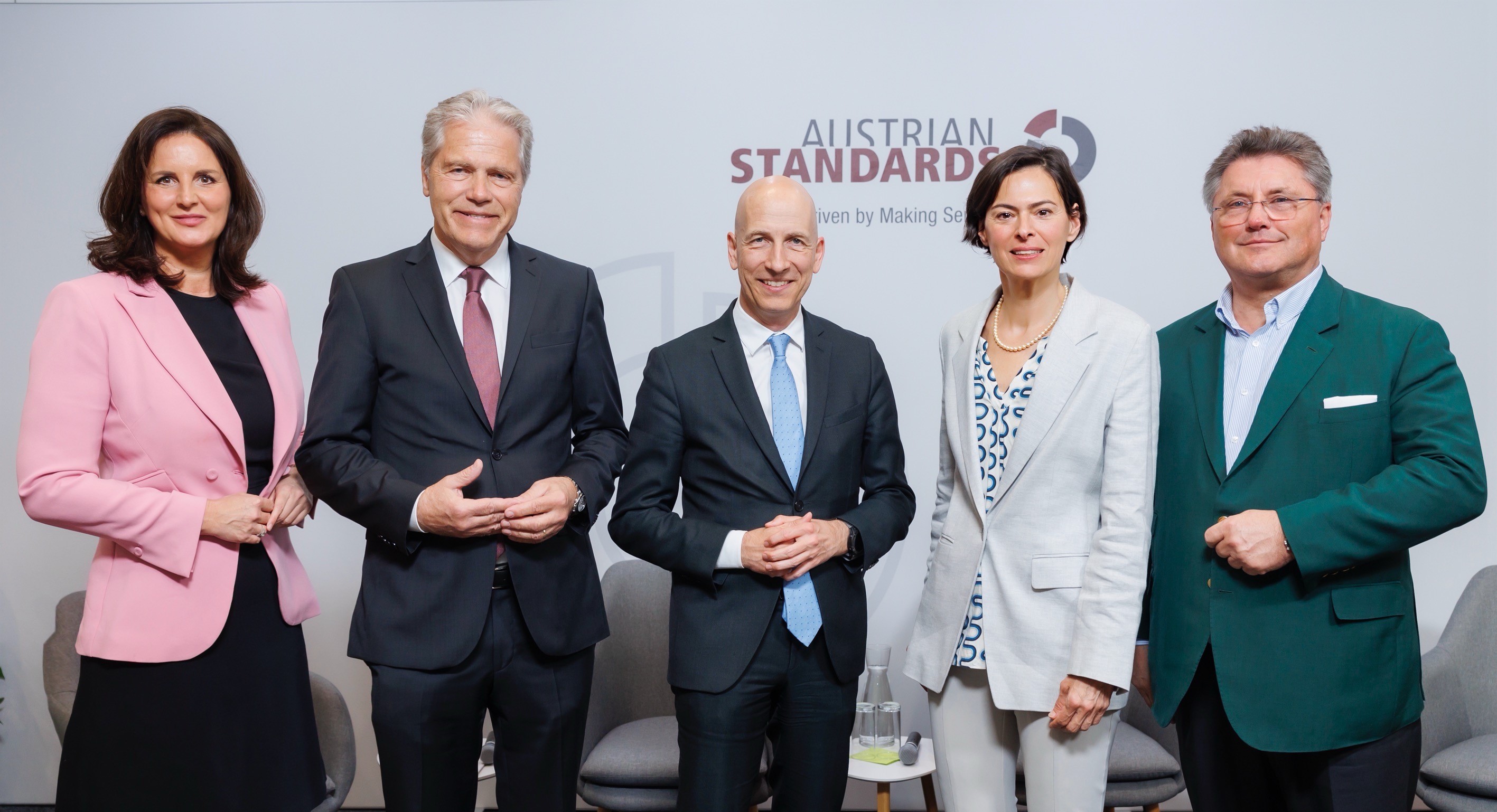Sustainable growth from standards

Austrian Economic Minister Martin Kocher, CFO Silvia Angelo of ÖBB Infrastruktur and PORR’s CEO Karl-Heinz Strauss in key dialogue at Austrian Standards
On 3 April, Anton Ofner, President of Austrian Standards International, and Valerie Höllinger, CEO & Managing Director of Austrian Standards, invited to the key dialogue on “Growth = Standard!?” to the House of Standards & Innovation in Vienna. The discussions focused on how the EU and Austria prioritize the strategic market power of standardization and opportunities for growth resulting from standardization.
In his introductory keynote address, Economic Minister Martin Kocher emphasized the significance and importance of standardization for the economy in Austria as well as Europe. Subsequently, he took a seat at the panel together with Silvia Angelo, managing board member of ÖBB Infrastruktur AG (with responsibility for finances, services and real estate) and PORR’s CEO Karl-Heinz Strauss who had presented positive results for 2023 to his shareholders a few days before in order to take part in the key dialogue with Valerie Höllinger. For many decades, the Austrian Ministry of Labour and Economy and the two enterprises have been active in technical committees, i.e. the bodies developing standards for Austria, Europe and at the international level. As a result, the two enterprises have first-hand knowledge of the market opportunities that arise out of standards from a business perspective.

Significance of standardization for our future
In 2022, the European Commission adopted a dedicated standardization for the first time in its history – the EU Strategy on Standardization. It puts the key transformation areas of sustainability, digitalization and resilience at the very top of the list of priorities. The objective of the Commission is “to put standards back at the core of a resilient, green and digital EU single market and to strengthen the global role of the European standardization system”. The three areas are not only focal subjects, but also markets with enormous potentials. The explicit goal of Europe is to be a global forerunner in creating standards since those who set the standards prevail in the market.
Given its age of only 31 years, the EU single market is a relatively young economic area. Nevertheless, Minister Martin Kocher took the view that a special standardization strategy had been urgently needed for this market characterized by clear values: “Standardization used to be a purely technical matter for a very long period and its significance for Europe’s economic area had been underestimated. Standards, however, are an important element of Europe’s autonomy and a driver of competitiveness. With the EU Strategy on Standardization, Europe sends a clear signal and takes a resolute stand in the field of standardization. If we set smart standards now, we make sure that Europe stays competitive with regard to investments in the green and digital transformation.”
Standards ensure competitiveness and growth
In response to the question on how standards can ensure growth especially in challenging times, Karl-Heinz Strauss clearly explained: “Just a few days ago, we were able to present record results for 2023 and we have improved at all levels. One of the reasons is our great strength in the fields of civil engineering and infrastructure construction. To succeed in those areas, you need in-depth knowledge of standards and their application. This is the only way in which you can make sure that construction processes are compatible and products are comparable. This optimizes costs and avoids risks. In particular for contracting authorities, this is often a decisive criterion.” Like ÖBB and many other enterprises, PORR is active in standardization work itself.
ÖBB also puts its trust in standards: “Railways are needed to tackle the climate crisis. We have to shift more passengers and freight from roads to rail and we have to do so quickly. To achieve that, we need standards. They do not only ensure efficiency and safety in railway operations, but also are a reliable basis for the development and maintenance of our infrastructure,” stresses Silvia Angelo.
Standardization brings together the perspectives of bright minds
Austrian Standards manages and coordinates the demanding process comprising the development and publication of standards. More than 4,700 experts from around 2,800 organizations meet in subject-specific committees and working groups. In a multi-faceted dialogue, Austrian Standards merges the manifold perspectives into a common recommendation – in a transparent and independent process involving all relevant stakeholders. “Sustainable solutions require common perspectives – a basic principle of standardization. Our commitment goes beyond national borders and supports the objective of the European Commission of promoting a green, digital and resilient internal market. This transformation requires strong, future-oriented and sustainable standards,” summarizes Valerie Höllinger.
Printable photos can be downloaded from the photo gallery at:
https://www.apa-fotoservice.at/galerie/36330
© APA / Roland Rudolph



